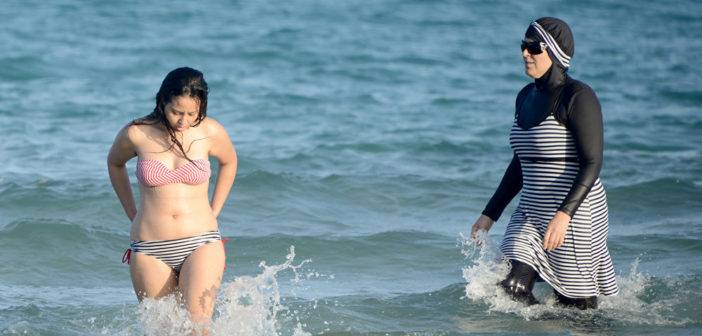How would you like to dress when you go to swim at beach or at the swimming pool? This question of whether to wear bikini or dress Islamically in burkini is causing a huge rift in France between Muslims and the others.
The decision by a handful of French mayors to ban the Islamic burkini swimsuit has divided the country and shocked its neighbours, with critics seeing the prohibitions as profoundly discriminatory.
Prime Minister Manuel Valls poured petrol on the fire, saying the garment was “not compatible with the values of France and the Republic” and that he supported towns that banned it. His utterance is seen as putting a question on the place of Islam in France, moving the burkini issue from the beaches to the political front.
The burkini, which covers the body and hair, is a “provocation” that risks causing “public disorder”, he told La Provence daily, echoing the mayor of Cannes, where three women have been fined 38 euros ($42) for sporting the swimsuit.
However, Valls ruled out implementing any nationwide ban.
“France cites latest threat to security: The Burkini,” the International New York Times teased in a front-page headline last week.
“The French emphasis on keeping religious attire out of public life can at times seem strange to foreigners,” the paper wrote, noting that head-covering bathing suits had been worn by several Arab athletes at the Rio Olympics without causing disturbances.
For Britain’s Daily Telegraph, the burkini bans enacted in the name of combatting extremism were themselves “foolish acts of fanaticism”.
Islamic dress mode has long been a subject of debate in France, which was the first European country to ban the Islamic face veil in public in 2010, six years after outlawing the headscarf and other conspicuous religious symbols in state schools.
Proponents of these bans argued that religious symbols should be relegated to the private sphere. Critics note however that the measures mainly target the Muslim minority and impinge on freedom of religion.
The ban on the burkini is coming due to the mounting anti-Islam sentiments in France as a result of recent terrorist attacks. Last weekend, youths on a beach on the French Mediterranean island of Corsica came to blows with a group of Muslim families, reportedly after a tourist snapped pictures of women bathing in burkinis.
Italian Interior Minister Angelino Alfano said Wednesday he believed the French model — which stresses the need for immigrant communities to assimilate — had failed. “Alas, I don’t think the French model has worked very well,” he told Corriere della Sera, saying the burkini bans were “a potential provocation” and could make France even more vulnerable to attack.
For sociologist Michel Wieviorka, the brouhaha is proof of a “radicalization on all sides — by nationalists, secularists and Islamists”.
“Politicians should try to calm tensions and stop creating hysteria,” he told AFP, asking politicians and burkini wearers to both step back from the fight.
France’s Human Rights League took aim at Valls for backing the anti-burkini mayors, accusing him of “participating in the stigmatisation of a category of French people who have become suspect, by virtue of their faith”.
Jean Bauberot, a sociologist specialising in secularism, saw the ban as proof of an illiberal drift in the home of liberty, equality and fraternity.
“You can be shocked by the headscarf or the burkini, and we can and should debate it, but without banning it. That’s democracy: tolerating difference, accepting otherness,” he told the Liberation newspaper.




